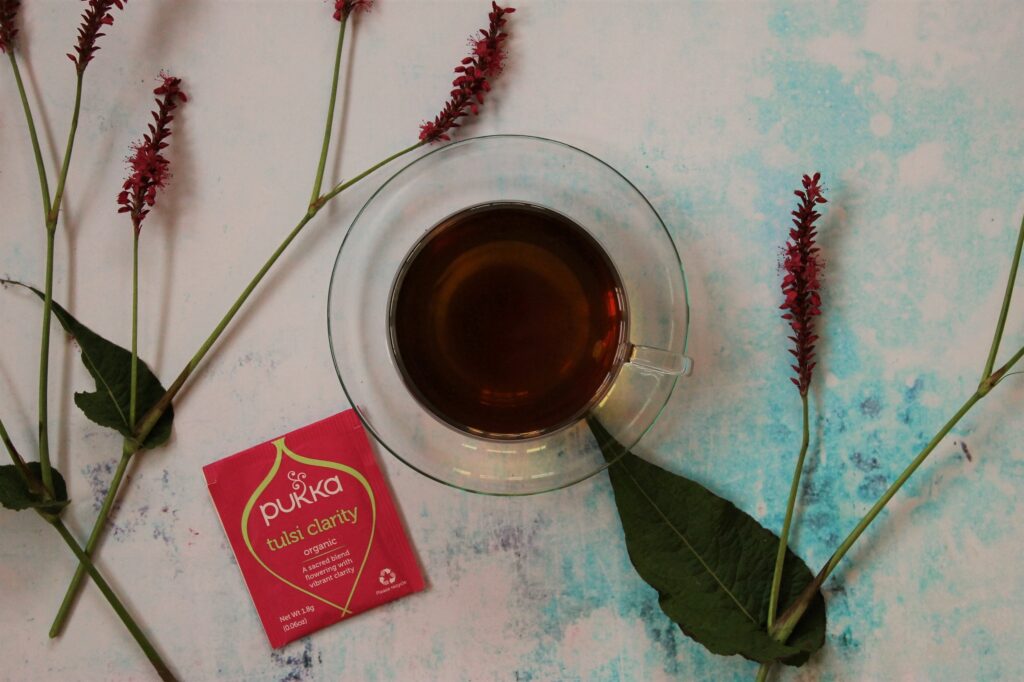This is my first ever tulsi tea. It’s going to be somewhat of a journey! I’m going to be exploring what tulsi tea is, what it tastes like, how to brew it, and importantly – what health benefits there are to drinking it.
If you’re new to tulsi tea, join me as I review Pukka Tulsi Clarity tea for the first time.
Do note, however, that Pukka teabags aren’t always the highest quality (even though their ingredients are usually organic or Fairtrade) so if you already know that you love tulsi, maybe find a better brand or even a loose leaf tulsi tea.
Pukka Tulsi Clarity at a Glance
- Blend: Three tulsi leaf types – Rama, Krishna, and Vana
- Flavour: Weak herbs with spicy warmth and notes of cinnamon
This is an interesting tea! The flavour is fairly nice, but I don’t think it has been named accurately. Rather than clarifying, this tea is warming with spicy cinnamon and cloves, and a hint of lemon.
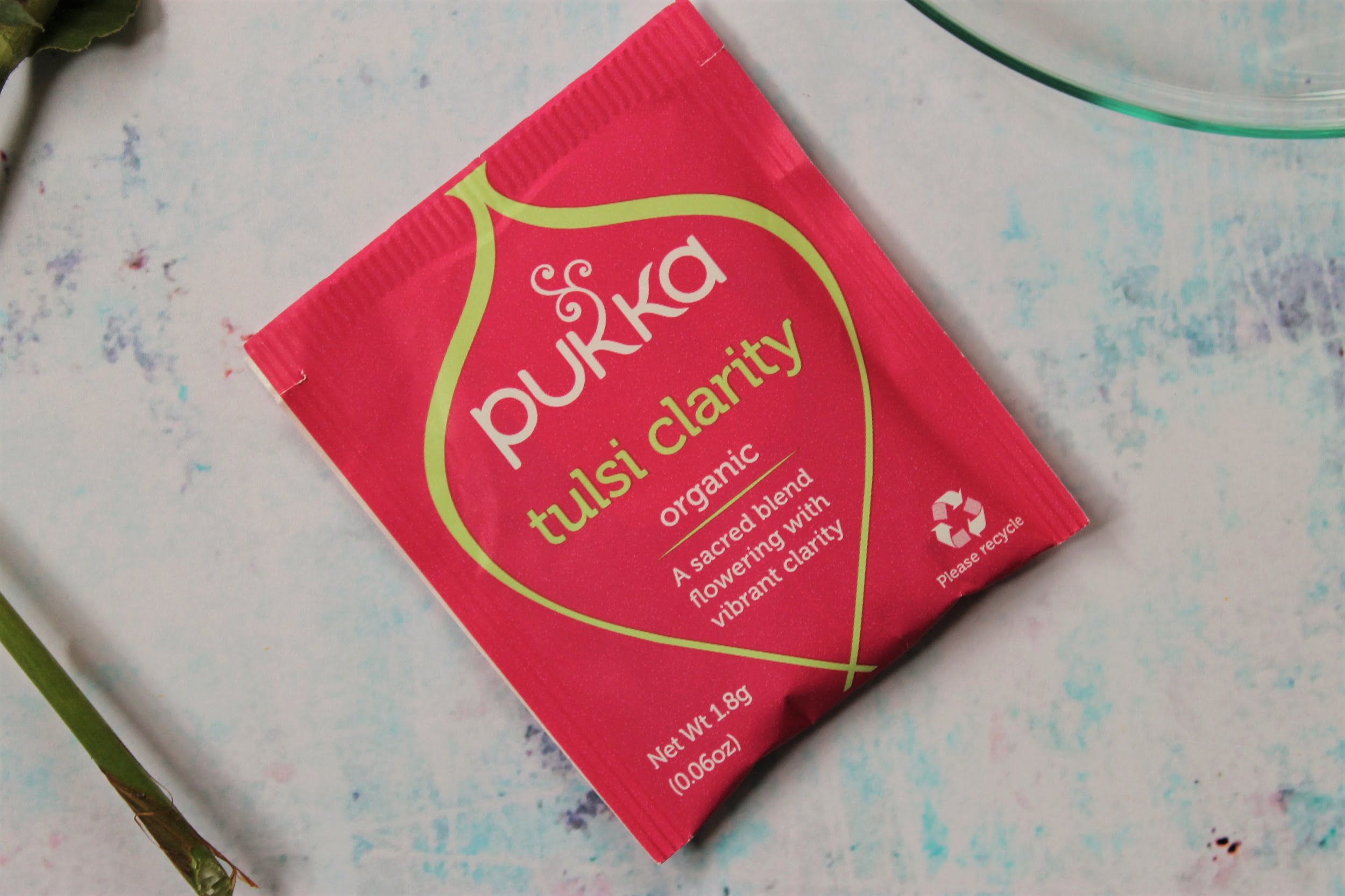

Full Review – Three Leaf Tulsi Blend
- Type: Tagged paper filter teabag
- Ingredients: green Rama tulsi leaf, purple Krishna tulsi leaf, lemon Vana tulsi leaf
- Health Benefits: Reduce stress, increase energy, soothe inflammation
- Flavour Notes: Weak herbs, warmth, spices, cinnamon
- Aroma: Cinnamon, fenugreek, cloves, nutmeg, lemon verbena
- Milk or Lemon: Lemon, if desired
- Where to Buy: Amazon
I was pleasantly surprised when I ripped open the teabag and wasn’t met with that generic musty herb flavour. That’s usually what Pukka teas are like before you brew them. But not this one! Notes of cinnamon, cloves and fenugreek hit your nose in an almost festive aroma. It’s really intriguing.
Once the tea brews (see brewing notes below) you’re left with a dirty, dark brown tea colour and a fair amount of tea dust at the bottom of your teacup.
The aroma coming from the brewed tea is even nicer. Notes of cinnamon and nutmeg remind me of Christmas but there’s also a lemony-herby note that’s a bit like lemon verbena. It’s an unusual combination but it’s definitely not unpleasant.
After the first sip of tea, I choked. It’s so dusty! The texture of this tea is quite thick but so dusty – it’s almost bitty. And I use a fine tea strainer… not that the bag split anyway.
As for the flavour, that weak generic herby note I’m accustomed to in Pukka teas has reared its head, but with warmth in the background. The more you drink, the warmer and spicier it gets. Cinnamon is quite delicious.
Overall, I didn’t find this tea refreshing or clarifying at all. The spice notes make it slightly cosy, but the texture and lemon verbena note give it a medicinal quality too.
I don’t think I’d ever drink this tea for the flavour. Tulsi isn’t my cup of tea.
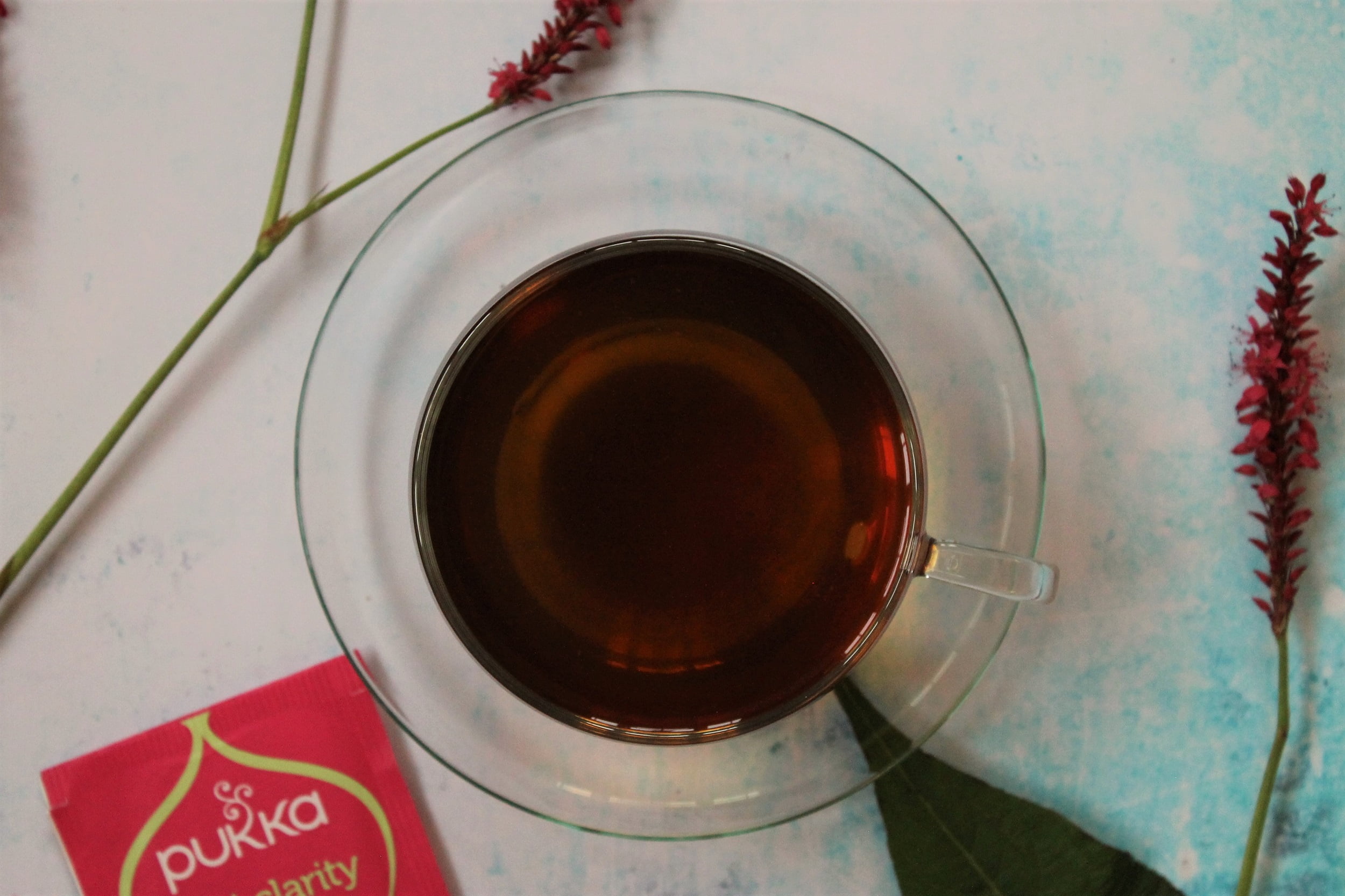

How to Brew Tulsi Herbal Tea
Pukka, as always, have been quite unhelpful here. Their brewing instructions are just “infuse for up to 15 minutes.” This vague brewing time, with no mention of water volume or temperature, meant I had to work out the optimum by trial and error. Eventually I figured out that 10 minutes is a good brew time for me.
Brew for 10 minutes, using 1x 1.8g teabag and 250ml of boiling water. Take a sip after 10 minutes and give it another 5 minutes if you think you can stomach it stronger.
I think a slice of lemon in this tea would really help lift it and give it a refreshing edge.
Why Drink Pukka Tulsi Clarity?
Pukka and I have a love-hate relationship. I love that they use mostly organic and Fairtrade ingredients. I also love that their packaging is totally biodegradable.
But I strongly dislike the way they treat their lovely ingredients. They chop them up so finely before they fill the teabags! This is not good – it dulls the flavour as the ingredients can oxidise faster. It also leaves a lot of dust in your teacup.
You can see in my photos that this is exactly what’s happened with Pukka Tulsi Clarity as well. It’s such a shame – I think the flavours would have been much more vibrant if the leaf pieces were larger or even whole.
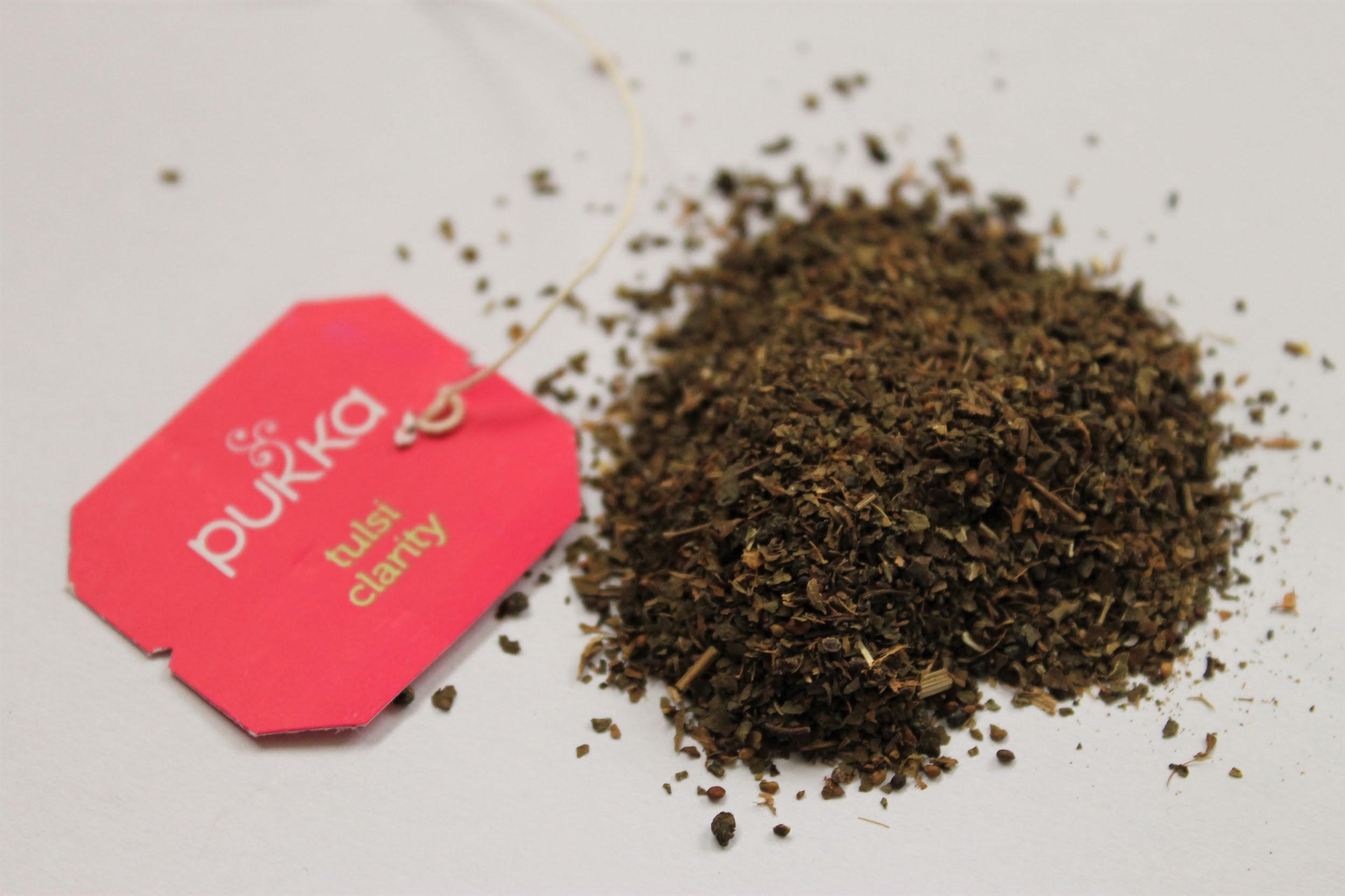

Tulsi (Holy Basil) Tea Health Benefits
Tulsi is an ancient medicinal plant from Asia that’s thought of as a cure-all… but there’s no actual modern scientific evidence proving this.
Nonetheless, there is evidence that tulsi has anti-inflammatory properties and it’s consumed worldwide today. Many people consume it to reduce stress and boost energy (even though it’s caffeine-free). This is why Pukka have labelled this tea “Tulsi Clarity” because it’s supposedly good for helping you energise and focus.
There are some side effects though – apparently it can reduce your fertility and slow blood clotting. Read the full The Spruce Eats article about tulsi tea to learn more about the health benefits and side effects.
Summary
Overall, I recommend this tea if you’re curious about tulsi teas. It will give you an idea of what flavours to expect. However, if you are already a fan of tulsi and want to find a high-quality, flavoursome tulsi tea… look elsewhere. This particular tulsi blend lacked vibrancy.
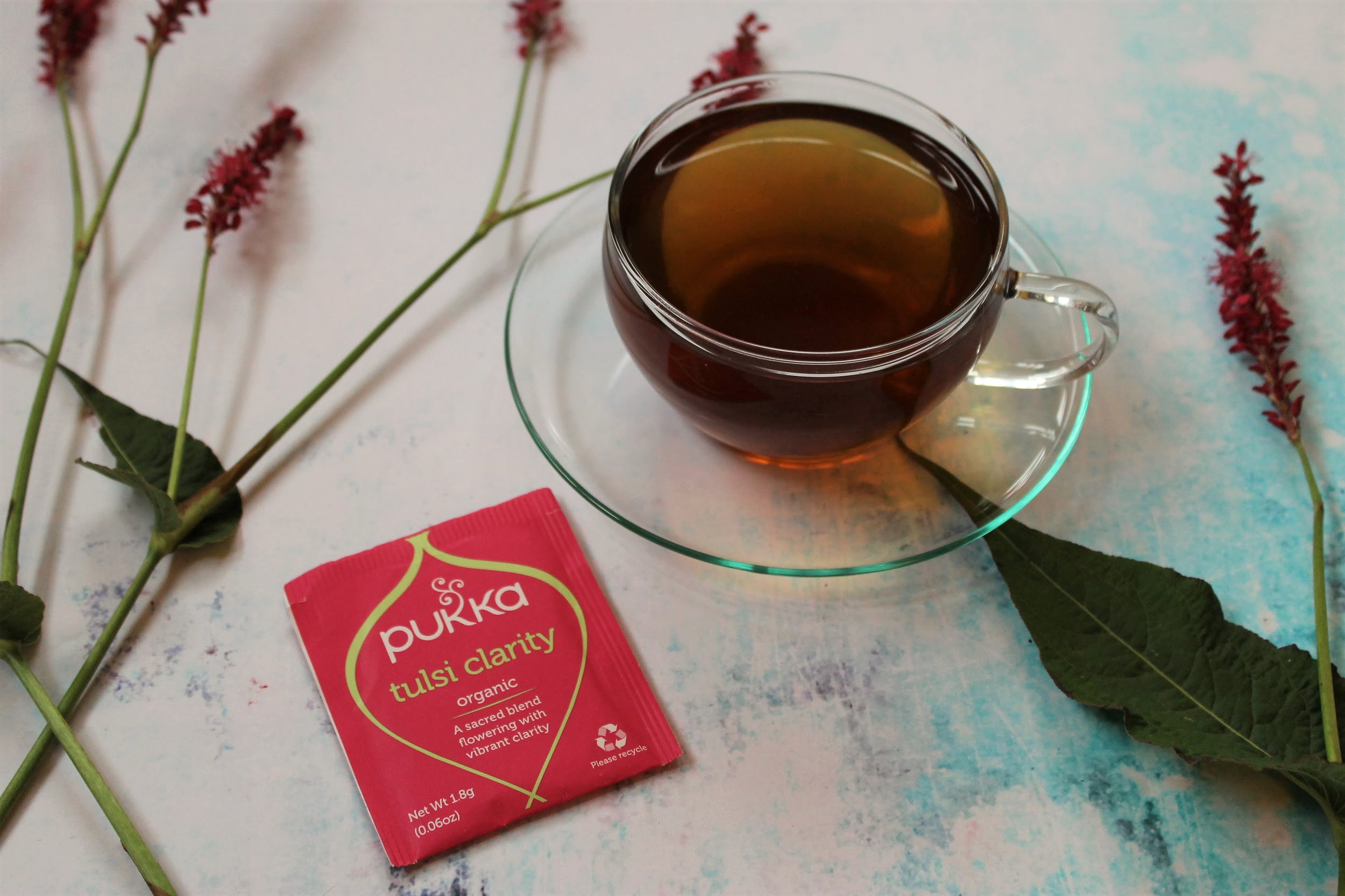

Tea Recommendation
If you’re looking for more ayurvedic, medicinal-type herbal teas, check out my Tea Review Index next. I’ve reviewed many teas by Pukka and Ayurveda Pura that are similar to this one! I’m sure you’ll find what you’re looking for, and if not, just leave me a comment below letting me know what tea I should review next.
